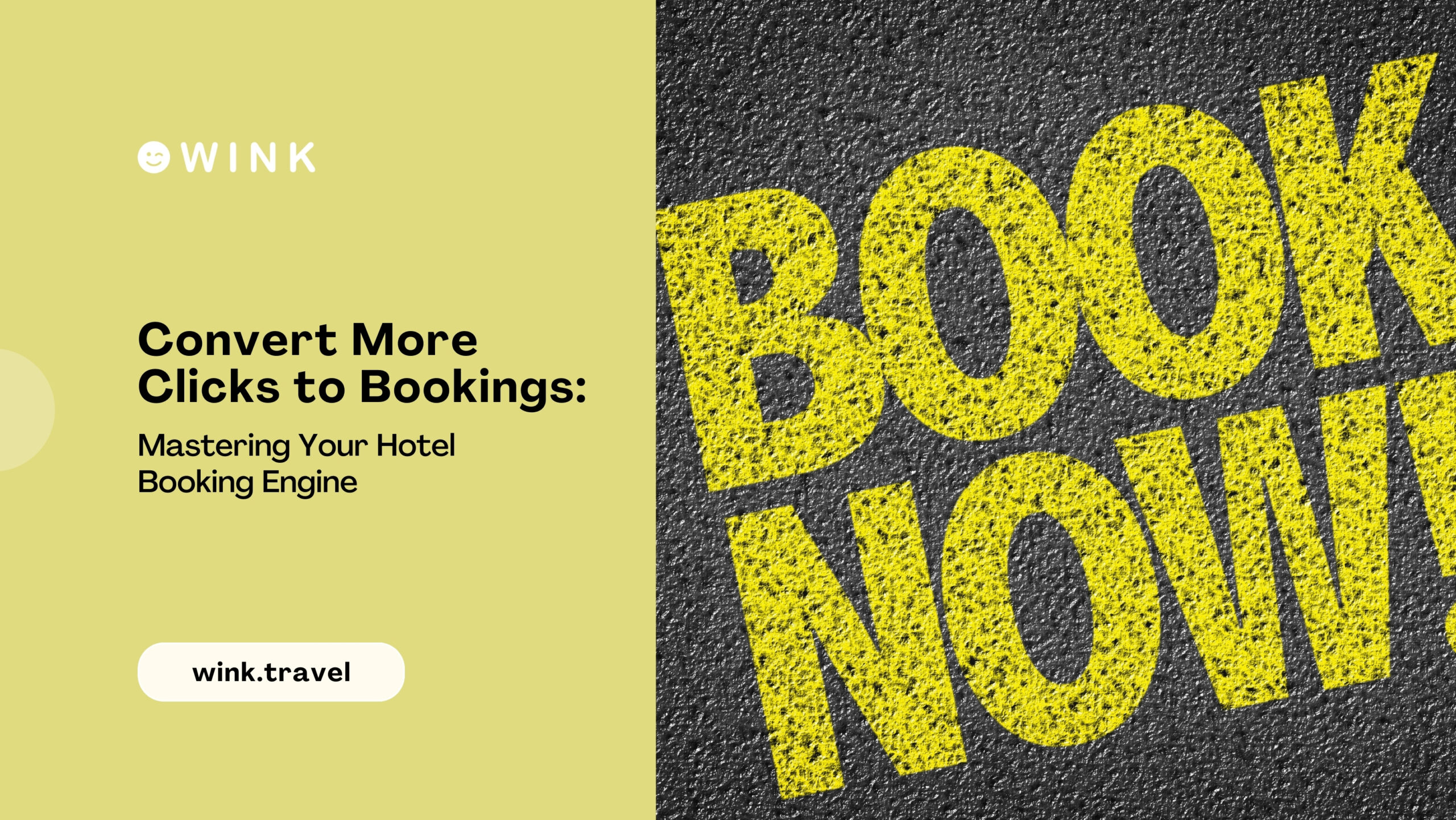In the digital age, your hotel’s online presence is more than just a virtual brochure; it’s your most powerful tool for attracting guests and driving direct bookings. Your hotel booking engine is at the heart of this online presence – a crucial component that can make or break your conversion rates.
Simply put, your conversion rate is the percentage of website visitors who complete a booking. Every click that turns into a reservation contributes to your hotel’s revenue and profitability. By optimizing your hotel booking engine, you can significantly increase those conversions and drive more direct bookings, reducing your reliance on third-party channels and maximizing your revenue potential.
In this article, we’ll explore the critical elements of a high-converting booking engine and provide actionable strategies for turning website visitors into satisfied guests.
Table of Contents
Understanding Your Hotel Booking Engine: The Path to Conversion
Search Functionality: The First Impression
The search functionality is the gateway to your booking engine. A user-friendly search bar with clear filters for dates, room types, and the number of guests makes it easy for visitors to find what they want. A well-designed search experience ensures guests can quickly and efficiently navigate their options, setting the stage for a smooth booking process.
Rate Display and Selection: Transparency is Key
Once guests have entered their search criteria, the rate display and selection process comes into play. This is where clarity and transparency are paramount. Display your room rates, including applicable taxes or fees, to avoid surprises later. Offer a variety of rate plans to cater to different needs and budgets and use visuals and descriptions to showcase the unique features of each room type.
Booking Form: Keep it Simple
The booking form is where the magic happens—a potential guest transforms into a confirmed reservation. Keep the form concise and intuitive, asking for only essential information. Avoid unnecessary fields or complex steps that could deter users from completing the booking.
Payment Processing: Secure and Seamless
A smooth and secure payment process is crucial for building trust and ensuring a positive user experience. To cater to different preferences, offer various payment options, including credit cards, debit cards, and digital wallets. Ensure your payment gateway is secure and compliant with industry standards to protect your guests’ financial information.
Confirmation Process: A Reassuring Finale
Once the booking is complete, a clear and informative confirmation page is essential. Provide a summary of the reservation details, including dates, room type, and total cost. Send a confirmation email with all the relevant information, and consider offering additional options, such as booking add-ons or requesting special services.
Optimizing for User Experience: Creating a Seamless Booking Journey
Clear and Concise Layout: Less is More
A cluttered and confusing booking engine can quickly deter potential guests. Opt for a clean and intuitive design that easily guides users through booking. Use clear headings, concise descriptions, and visually appealing elements to make the experience enjoyable and stress-free.
Mobile Optimization: On-the-Go Bookings
With the rise of mobile bookings, ensuring your booking engine is fully responsive across all devices is crucial. A mobile-optimized design adapts seamlessly to different screen sizes, providing a consistent and user-friendly experience whether guests book from their smartphones, tablets, or desktops.
Fast Load Times: Speed is Key
In today’s fast-paced world, no one wants to wait for a slow-loading website. Optimize your website’s speed to reduce bounce rates and keep users engaged. Compress images, leverage browser caching, and minimize unnecessary code to ensure a lightning-fast booking experience.
Intuitive Navigation: Effortless Exploration
Make it easy for users to find the information they need. Use clear calls to action, intuitive menus, and a logical flow that guides them through the booking process. Consider adding a progress bar to visually indicate where they are in the process and provide a sense of accomplishment as they move towards completing their reservation.
Secure Payment Processing: Building Trust
Security is paramount when it comes to online transactions. Use trusted payment gateways and display security badges to reassure guests that their financial information is safe. Offer various payment options to cater to different preferences and ensure a smooth and secure checkout experience.
A well-designed booking engine with a great user experience can help increase bookings and revenue. Focus on these best practices to achieve this goal.
Effective Rate Display and Selection: Turning Lookers into Bookers
Clear and Concise Rate Information: Transparency Builds Trust
Transparency is critical to building trust with potential guests. Display your room rates clearly and concisely, ensuring that all relevant fees and taxes are shown upfront. Avoid hidden costs or surprises that could deter guests from completing their booking. A breakdown of the total price, including room rate, taxes, and any additional fees, fosters transparency and builds confidence in your pricing.
Flexible Rate Options: Catering to Diverse Needs
Offer a variety of rate plans to cater to different guest needs and preferences. This could include options like:
- Best Available Rate: Your standard, flexible rate.
- Non-Refundable Rate: A discounted rate for guests who are sure of their travel plans.
- Package Deals: Offer bundled rates, including breakfast, spa treatments, or airport transfers.
- Loyalty Program Rates: Provide exclusive discounts or perks for your members.
Visual Aids: Showcasing Your Rooms
A picture is worth a thousand words, especially in the hospitality industry. Use high-quality images and detailed descriptions to showcase your rooms and highlight their unique features and amenities. Consider incorporating virtual tours or 360-degree views to provide an immersive experience for potential guests.
Upselling and Cross-selling: Maximizing Revenue
Your booking engine is also an opportunity to increase revenue through upselling and cross-selling. Offer additional services or packages that complement the guest’s stay, such as room upgrades, spa treatments, or dining experiences.
By strategically presenting these options during the booking process, you can entice guests to enhance their stay and boost your hotel’s revenue potential.
Ultimately, an effective rate display and selection process is crucial for converting clicks into bookings. By prioritizing transparency, offering flexible options, utilizing visual aids, and incorporating upselling techniques, you can create a compelling booking experience that drives conversions and maximizes revenue for your hotel.
Conversion Optimization: Turning Clicks into Confirmed Bookings
Compelling Calls to Action (CTAs): Guide the Guest
A clear and compelling call to action (CTA) is essential for guiding guests towards completing their booking. Use action-oriented language like “Book Now,” “Reserve Your Stay,” or “Check Availability” to encourage immediate action. Make your CTA buttons visually prominent, using contrasting colors and clear placement to draw attention.
Trust Indicators: Build Confidence
Building trust is crucial in the online world. Display trust badges, security certifications, and customer testimonials to reassure guests that your booking engine is secure and reliable. Highlighting your hotel’s commitment to data privacy and secure payment processing can increase user confidence and encourage them to complete their booking.
Social Proof: Leverage Testimonials and Reviews
Positive guest feedback is a powerful tool for persuasion. To demonstrate the value and quality of your hotel, showcase testimonials and reviews from satisfied guests. Consider incorporating a rating system or displaying reviews from reputable travel platforms to build credibility and encourage bookings.
Limited-Time Offers: Create a Sense of Urgency
Introduce a sense of urgency with limited-time offers and promotions. Highlight special deals, discounts, or packages only available for a limited time. This encourages guests to book sooner rather than later, reducing the likelihood of them abandoning their booking or shopping for alternative options.
A/B Testing: The Power of Experimentation
A/B testing involves comparing two versions of your booking engine to see which performs better. Experiment with different elements, such as CTA button colors, placement of trust badges, or the wording of your promotions. You can identify the most effective combinations by analyzing the results and continuously optimizing your booking engine for maximum conversions.
Using these conversion optimization techniques to create a booking engine that attracts guests and makes it easy for them to book their stays will help increase your hotel’s revenue.
Tracking and Analytics: Measuring Success and Driving Improvement
Key Metrics: Measuring What Matters
Several key metrics can help you gauge the effectiveness of your booking engine:
- Conversion Rate: The percentage of visitors who complete a booking.
- Average Booking Value: The average amount spent per booking.
- Time on Site: How long do users spend on your booking engine pages?
- Bounce Rate: The percentage of visitors who leave your booking engine after viewing only one page.
- Exit Pages: The pages from which users most frequently exit your booking engine.
By monitoring these metrics, you can identify areas of friction in the booking process and pinpoint opportunities for improvement.
Analytics Tools: Harnessing the Power of Data
Tools like Google Analytics provide a wealth of data about your booking engine’s performance. You can track user behavior, analyze traffic sources, and identify trends that can inform your optimization strategies. Many booking engine providers also offer built-in analytics dashboards that provide valuable insights into key metrics.
Data-Driven Optimization: Making Informed Decisions
Don’t just collect data; use it to make informed decisions. Analyze your booking engine’s performance to identify areas for improvement. For example, suppose you notice a high bounce rate on a particular page. In that case, it might indicate a confusing layout or a technical issue that needs to be addressed. If your conversion rate is low, you might need to refine your call to action or offer more enticing promotions.
Conclusion
A well-optimized booking engine is your key to success in the competitive landscape of online hotel bookings. By understanding its key components, prioritizing user experience, effectively displaying rates and options, and implementing conversion optimization techniques, you can transform your booking engine into a powerful revenue-generating machine.
Remember, every click is an opportunity. By tracking your booking engine’s performance and making data-driven decisions, you can continuously improve your conversion rates and drive more direct bookings.
Don’t let potential guests slip away – there’s no time like the present to embrace these strategies and unlock the full potential of your hotel booking engine.









